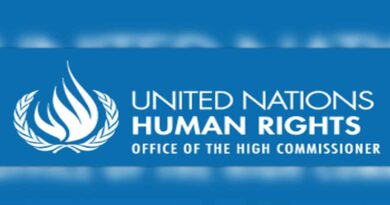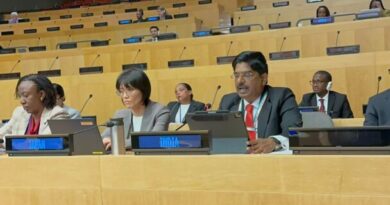Plea In Apex Court Challenges Notification Of Union Government; Section 2(C) of NCM Act,1992,Seeks District-Wise Identification.
(Judicial Quest News Network)
A plea has been filed in Apex Court challenging a provision of the National Commission for Minorities (NCM) Act, 1992 seeking a direction to identify minorities at district level for the purpose of granting benefits under Article 29 and 30 of the Constitution.
The petition seeks to declare the 1993 notification of the Central Government declaring Muslims, Christians, Sikhs, Buddhists, Parsi and Jain as Minority at National level, is arbitrary irrational and contrary to Articles 14,15,21,29 and 30 of the Constitution.
The Notification had notified 5 Communities as “the minority communities”they are as follows
- Muslims
- Christians
- Sikhs
- Buddists
- Zoroastrians (Parsis)
The Article 29, 30 describes
ARTICLE 29 OF THE CONSTITUTION OF INDIA 29. Protection of interests of minority’s. Any section of the Citizens·· residing in the territory of India or any part. thereof having a distinct language, script or culture of its own shall have the right to conserve the saroe citizen shall be denied admission into any educational institution maintained by the State or receiving aid out of State funds on grounds only of religion, race, caste, language or any of them
ARTICLE 30 OF THE CONSTITUTION OF INDIA 30. Right of minorities to establish and administer educational institutions. Minorities whether based on religion or language, shall have the right to establish and administer educational institutions of their choice (l.A) In making any law providing for the compulsory acquisition of any property of an educational institution established and administered by a minority, referred to in clause ( 1 ), the State shall ensure that the amount fixed by or determined under such law for the acquisition of such property is such as would not restrict or abrogate the right guaranteed under that clause f{1} The state shall not, in granting aid to educational institutions, discriminate against any educational institution on the ground that it is under the management of a minority, whether based on religion or language.
The PIL filed by Devkinandan Thakur also challenges the constitutional validity of Section 2(c), of the National Commission of Minorities Act, 1992, which gives Centre power to notify minorities.
It is stated that Hindus are numerically less in certain states and region
Religion wise population of 9 States/UTs are as under:
| Religion | Ladd | Miz | Laks | Kas | Nag | Megh | Arun | Punj | Man |
| Hindu | 1 | 2.75 | 2.77 | 4 | 8.74 | 11.52 | 29.04 | 38.49 | 41.2 9 |
| Islam | 46 | 1.35 | 96.58 | 95 | 2.44 | 4·39 | l.9 | 1.93 | 8.40 |
| Christian | – | 87.1 | 0.49 | – | 88.1 | 74·59 | 30.26 | 1.26 | 41.3 |
| Budhism | 50 | 8.51 | 0.02 | 0.20 | 0.34 | 0.33 | 11.76 | 0.12 | 0.25 |
| Jainism | – | – | 0.02 | – | 0.13 | 0.02 | 0.10 | 57.69 | 0.05 |
| Parsis | – | – | – | – | – | – | – | – | – |
| Others | 2 | 0.23 | 0.01 | 0.60 | 0.24 | 9.05 | 27 | 0.35 | 0.38 |
Hindus are merely 1 % in Laddakh, 2. 75% in Mizoram, 2. 77% ‘ ‘ m Lakshadweep, 40% in Kashmir, 8.740%o in Nagaland, 11.520% in Meghalaya, 290% in Arunachal Pradesh, 38.490% in Punjab · and 41.290% in Manipur but Central Government has not declared them ‘minority’ under Section 2(c) of the NCM Act and Section 2(f) of the NCMEI Act, thus Hindus are not protected under Articles 29-30 and cannot establish-administer educational institution of their choice.
On the other hand, by using· unbridled power under S. 2(c) of the NCM Act and S2 (f) of the NCMEI Act, Centre has arbitrarily declared Muslims as minority, who are 96.58 % in. Lakshadweep, 950% in Kashmir & 46% in Laddakh. Centre has declared Christians as minority, who are· 88.1o %in Nagaland, 87.160% in Mizoram & 74·59% in Meghalaya so they can establish & administer education institution of their choice. Likewise, Sikhs are s7.6 % in Punjab & Buddhists are 50% in Laddakh and they can establish & administer educational institution but not the followers of Bahaism & Judaism, who are merely 0.10% and 0.20% respectively. Therefore, petitioner is challenging validity of Section 2(f) of the National Commission for Minority Educational Institution Act 2004, for being arbitrary, irrational &contrary to Articles 141 15, 21, 29, 30 of the Constitution.
The petition if filed through Advocate Ashutosh Dubey.
It is further stated that after the judgement in TMApai cases (2002) 8 SCC481) the position is that the unit for determining status of linguistic and religious minorities would be State.
“The Judgment in the TMA Pai Case is law of the land; hence, the identification of religious and linguistic ‘minority’ has to be done on State only and Centre has to exercise its power. under NCM Act & J : NCMEI Act, not merely on the advice and recommendation of the National Commission for Minorities but also On consideration of 7 social cultural and religious conditions of the cqmmunity in each State. Religious and linguistic minorities for the purposes of Articles 29-30 must be determined State-wise countenancing numeric proportions of various groups and communities in each State. However, despite the’ above unequivocal position of law, the Centre has c~mpletely failed to apply the above principle evenly by excluding not only Hindus but also the followers of Bahaism· and judaism from the purview of ‘minority’ status under Section 2(c) of the NCM Act and Section 2(f) of the NCMEI Act”.
The Apex Court is considering a similar PIL filed by Advocate Ashwini Kumar Dudey challenging the provisions of NCM Act and NCMEI Act and seeking minority status for Hindusin certain states/UTs.
The petitioner seeks following direction direct and declare that Section 2(c) of the National Commission for Minorities Act 1992, is void, unconstitutional and inoperative for being violative of Articles 14, 15, 21, 29 and 30 of the Constitution; b) direct and declare that the Notification on Minority Community, issued by Ministry of Welfare, Government of India on 23.10.1993, is arbitrary irrational and contrary to Articles 14, 15, 21, 29, 30 of the Constitution, hence void, constitutional and inoperative; c) direct the respondents to define {minority’ and lay down {guideline for identification of minorities at district level’, in order to ensure that only those religious and linguistic groups, which are socially economically politically non-dominant & numerically very inferior, get the benefits and protections guaranteed under Articles 29-30; d) pass such other order(s) or direction(s) as Hon’ble Court may deem fit and proper in facts of the case and allow the cost to petitioner.




